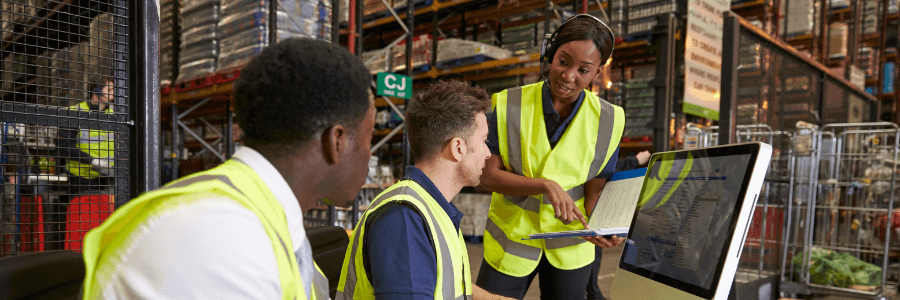AI in the Warehouse: Why Specialty Wholesalers Need Strong AI Policies

Quick look: Artificial intelligence (AI) can help increase productivity, keep teams organized, and uncover predictive insights. But without a clear workplace policy, it can also introduce risks. Here’s why a well-defined AI policy is essential for specialty wholesalers, and how a professional employer organization (PEO) can provide support.
AI has quickly become crucial in the specialty wholesale industry, offering opportunities to streamline internal operations and enhance customer experiences. But as these tools become more common, it’s important for wholesale companies to develop AI policies that promote ethical use, protect sensitive data, and maintain compliance.
In this blog, we’ll explore the role of AI in specialty wholesale, why formal policies matter, and how a PEO can help your business create and maintain a responsible AI strategy.
How specialty wholesalers use AI today
From footwear to office equipment to medical supplies, specialty wholesalers rely on a wide range of operations to stay competitive. Increasingly, they’re turning to AI to streamline daily tasks and refine future workflows. Common use cases include:
- Smart inventory automations: AI helps check stock levels, track shipments, and trigger alerts on restock requests.
- Equipment maintenance: Engineers use AI to increase equipment safety by optimizing equipment performance checks, identifying potential malfunctions, and tracking past performance reports.
- Demand forecasting: AI improves decision-making with predictive insights about inventory needs, sales trends, and customer behavior.
- Fraud prevention: Some AI algorithms detect unusual patterns, such as repeated login attempts or bulk orders within a short time frame that may signal fraud.
- Customer support automation: Teams can use AI to manage quote requests, categorize tickets by priority, and send employees follow-up reminders.
- HR management: AI can help HR departments reduce recruitment bias, schedule job postings, assign onboarding tasks, send performance review reminders, and analyze employee data to identify career skill gaps and retention rates.
Why AI policies matter
AI can be a powerful asset, but only when its risks and benefits are thoughtfully managed. That’s where an AI policy comes in. Often found in employee handbooks, this document outlines your company’s AI guidelines and approved use cases.
A formal policy promotes responsible innovation. It holds everyone accountable, aligns with company values, and ensures transparency in decision-making. It also helps wholesalers stay compliant with evolving AI regulations, protect sensitive employee data, and reduce biases in automated hiring processes and employee performance monitoring. In other words, a well-maintained AI policy can strengthen business results without hindering brand integrity.
Key components of an effective AI policy
No matter your AI approach, every policy should include the following features to balance workplace safety with operational efficiency.
A list of work-approved AI tools: The AI market is booming, with new tech emerging and upgrading daily. Once you’ve chosen the tools that best match your company’s needs, document their purpose, authorizations, implementation processes, and ethical use guidelines.
State AI mandates: More states are introducing regulations to help SMBs safely engage with AI. Be sure your policy references any relevant laws, including:
- New York’s Bias Audit Law requires annual audits of automated employment decision tools (AEDTs) to prevent algorithmic bias in hiring and promotions.
- New Jersey expanded its Law Against Discrimination (LAD) guidelines which now includes protections against AI-driven workplace discrimination.
- The upcoming Texas Responsible Artificial Intelligence Governance Act (TRAIGA) will regulate AI development and use based on approved ethical, privacy, and public safety standards.
Data privacy and security: Specialty wholesalers with high data security standards build better employee experiences and customer trust. Include clear protocols that demonstrate compliance with federal and industry regulations, such as the General Data Protection Regulation (GDPR) and the California Consumer Privacy Act (CCPA).
Bias and fairness checks: Routine AI evaluations protect wholesalers from discriminatory algorithms, unchecked automation, and other potential risks. Outline your commitment to ethical AI in your policy.
Employee training: From introducing new tech to reiterating best practices, explain your wholesale company’s training strategy to educate workers on responsible AI use.
Emphasis on AI being a tool, not a takeover: AI apprehension is a growing concern, with 53% of employees worried that using AI for job tasks would make them seem replaceable. Reassure your workforce that AI is here to support their daily tasks, not limit their roles or be the sole decision-maker in business functions.
How a PEO supports responsible AI adoption
Partnering with a PEO like ExtensisHR can make navigating the complexities of AI adoption easier and more effective with key areas of support including:
- Policy development: Assistance with creating and updating AI policies
- Risk mitigation: Identifies potential AI-related risks and preventative measures to minimize them
- Compliance support: Expert guidance to help wholesalers stay ahead of federal, state, and local AI regulations
- Learning and development management: Guidance in building AI-focused training strategies, from reskilling employees to gathering course feedback and measuring effectiveness
- Employer Protection Program (EPP): Provides access to cybersecurity tools and optional cyber liability insurance
- Complimentary recruiting services: Combines human expertise with compliant AI tech to efficiently source top talent and build a high-performing workforce
Leveraging these strategies lead to more positive AI outcomes, such as 91% of users feeling more motivated and finding greater enjoyment in their work.
With the right partner and policies in place, your specialty wholesale business can embrace an AI approach that drives productivity, improves decision-making, and helps your operation stay competitive.
Contact ExtensisHR today to learn how our tailored HR services help you implement responsible AI practices.



